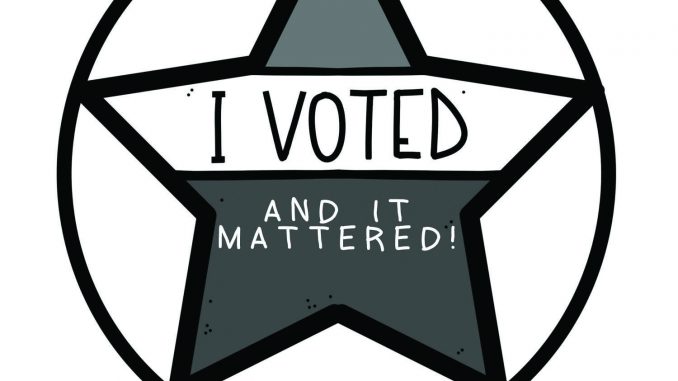
By Charlie Pohlson, Staff Writer
 The U.S. midterm elections will take place on Nov. 6, right in the middle of President Trump’s four-year term. But these elections shouldn’t have anything to do with that guy.
The U.S. midterm elections will take place on Nov. 6, right in the middle of President Trump’s four-year term. But these elections shouldn’t have anything to do with that guy.
These elections are about our other representatives. We’re represented by senators, congressmen, and local politicians as well. What most people don’t know is how important these elections actually are.
These representatives are making decisions on our behalf, making decisions that affect our everyday lives. Everyone has their own political views, and not everyone has the exact same thoughts, so we choose representation that will most benefit us and our regular lives. So, to sum it up, you’re really not voting for the representative, you’re voting for the issues.
Although general elections have a higher turnout rate than midterm elections, they’re just as important.
When Hoss Jager and Marla Day, two government teachers at Indian Trail High School & Academy, were asked if they were going to vote this midterm election, they both answered yes.
“It’s my civic duty,” said Day. “All issues somehow affect me or my family members, so I want to make sure that I go out there and put my say in.”
“If you want a democracy to work, then you have to participate,” said Jager.
And they’re right -— if you do want a democracy to work, you have to participate, especially the younger generations. If you pay attention to political ads, you can see that they are geared way more towards older people, concerning issues that affect them more than anyone else.
Both government teachers claimed that they both have a high political efficacy, a belief that your vote makes a difference. But they also agreed that younger generations have high political apathy, a belief in which you think that your vote does not make a difference.
“I think that youth in general throughout history have always felt that they can’t make much of a difference,” said Jager.
So what could we be doing to educate and promote voting to the younger generations? Don’t ask Hillary Clinton, she wouldn’t know. But in all seriousness, there are definitely ways that we, as a nation, could do more to encourage more voter participation.
Some countries have mandatory voting, but that would take away the whole choice aspect of it. Some countries have the election days on more convenient days, like on a weekend.
“Moving [Election Day] to Sunday would probably be better because students as well as adults on a Tuesday afternoon, after they get out of work or school, that’s the last thing they want to do, is sit in a line to vote,” said Jager. “That’s discouraging.”
You can register to vote through printing a form and mailing it in, going to your local election office, or registering here at school, if you haven’t already.
“Everybody that doesn’t vote needs to realize that if you don’t vote, you’re allowing a particular group to control our government, and it’s normally the elite. Basically, you’re creating a little circle of elite, and they’re dictating what our laws are. So if you don’t go out there and vote, then you can’t break up that group. That’s why you vote,” said Day.
*You can mail in your voter registration in Wisconsin at:
Government Accountability Board, 212 East Washington Avenue, Third Floor P.O. Box 7984 Madison, Wis. 53707-7984
